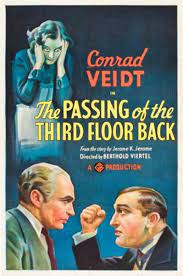
Stasia (Rene Ray) is a young maid who works and lives at Mrs. Sharpe’s (Mary Clare) boarding house. Stasia is a juvenile delinquent who is in servitude as part of a London rehabilitation program. The boarding house has an assortment of tenants that are, for one reason or another, depressed with their lot in life. They are also deep into the caste system and look down upon each other, especially Stasia.
Major Tomkin (John Turnbull) and his wife (Cathleen Nesbitt) are experiencing financial difficulties and are trying to marry off their daughter, Vivian (Anna Lee) to Mr. Wright (Frank Cellier), an older self-man businessman who flaunts his wealth. Vivian, although going along with the arranged marriage, is really in love with Chris Penny (Ronald Ward). Chris, who is in love with Vivian, is an architect with few job prospects. Miss Kite (Beatrix Lehmann) is afraid of getting old. Mr. Larkcom (Jack Livesey) is classically trained on the piano but is reduced to playing jazz at a local record store. Mrs. De Hooley (Sara Allgood) is a gossip and a snob. All of them, except Stasia, are snippy, catty and entitled. When Mrs. Sharpe is especially hard on Stasia, the girl says a prayer hoping for one decent person in the world.
Into this menagerie comes the Stranger (Conrad Veidt), a mysterious man who is looking to rent a room. The only room available is on the third floor in the back of the house. The Stranger takes the room and begins observing the residents. With gentle conversation, and perhaps a little magic, the Stranger begins to bring out the best of the residents and starts to steer them in the direction of a happier and kinder life. Mr. Wright sees what the Stranger is doing and decides that he wants everyone to be as miserable as he is. Through manipulation he begins to undo everything that the Stranger had accomplished.
“The Passing of the Third Floor Back” was released in 1935 and was directed by Berthold Viertel. It is a British drama with fantasy undertones. The film was based on a 1908 play by Jerome K. Jerome. The play had been previously adapted as a silent movie in 1918. The film can be a little difficult to find.
The characters in the film spent so much time being horrible people that I wasn’t sure I would have bothered to try to make their lives better. That’s probably a testament to their acting. The acting really was good. Conrad Veidt is a strange choice to play what amounts to be a guardian angel or a sort of Mary Poppins for the rude an obnoxious but somehow, he manages to pull it off. Rene Ray does a good job looking like a waif and Frank Cellier is wonderful as the evil Mr. Wright.
The story would normally be the theme of a children’s fairy tale but, even though the story is not exactly deep, it is expressed as an interesting drama. The back and forth between Veidt and Wright is like a biblical game of good vs evil, God vs Satan.
Conrad Veidt is best known for playing the somnambulist, Cesare in “The Cabinet of Doctor Caligari” 1920, “Jaffar in “The Thief of Bagdad” 1940 and Major Heinrich Strasser in “Casablanca” 1942. If you are a Conrad Veidt fan, or even if you’re not, it’s definitely worth finding.

